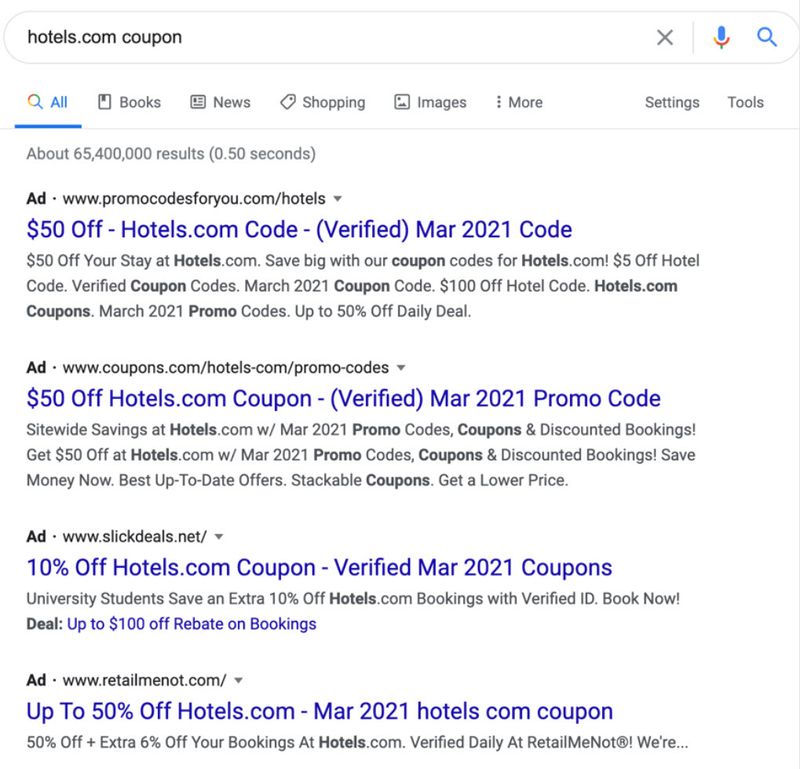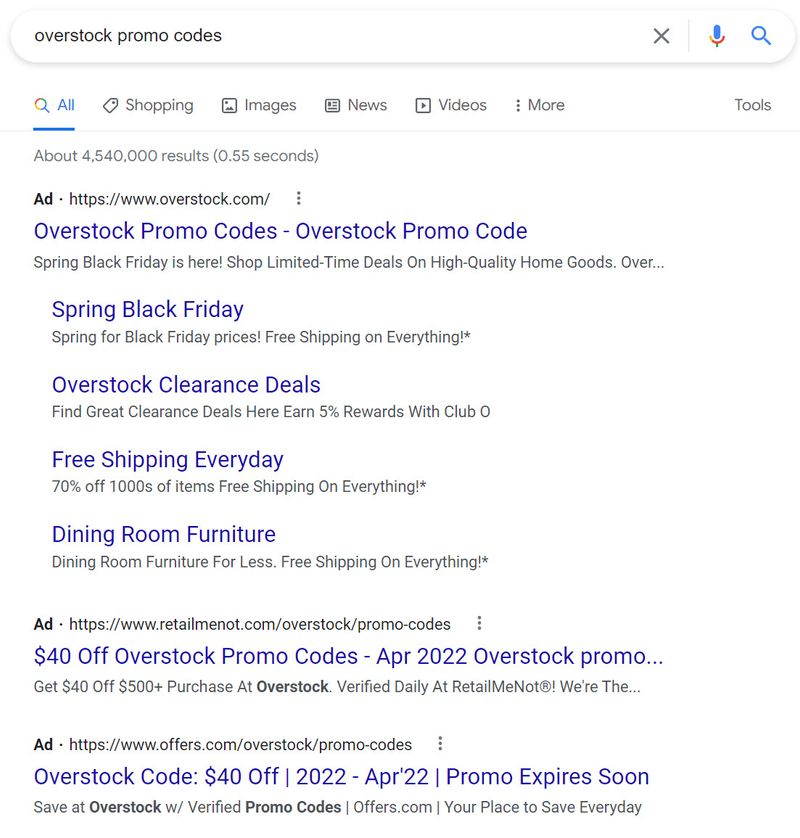What is Trademark Bidding?



Trademark bidding, also known as brand bidding, is a form of search engine advertising where a company buys ad space on the search engine results page (SERP) of certain keyword search terms, paying for the right to advertise there. Much like organic search results, ads are usually composed of a headline, a display URL, and description text. But because they can be listed above organic results and be the first thing people see, ad positions are highly coveted by digital marketers.
Subsequently, search engines facilitate an auction-based system in which advertisers bid against each other on advertising rights for their desired keyword terms. Bidders pay using various models such as pay-per-click (PPC), cost-per-acquisition (CPA), cost-per-thousand, cost-per-call, or cost-per-lead. Needless to say, each search engine has its own unique trademark bidding policies by which marketers must abide and can use to their advantage.
Bidding on branded keywords that explicitly contain a company’s unique name in part of the search is a crucial marketing strategy because these words demonstrate high purchasing intent. Unlike generalized, informational keywords that suggest web users are simply researching and learning more about a topic, branded terms indicate users have already decided to buy a product and are actively looking for the best, immediate deal to close their purchase cycle. Examples of branded keywords might be “Nike shoe sale,” or “Hilton hotel booking.” Targeted ads on these branded keywords increase click-through rates and conversion rates, ultimately securing higher sales figures. A 2016 report finds that businesses earn $8 for every $1 spent on Google Ads. In fact, during the 2019 holiday season, Toyota automobile group achieved a 67% increase in conversion rates and a 34% reduction in cost per conversion by partnering with Google Ad’s in-market audience initiative. Besides directly raising profit numbers, trademark ads also widen brand visibility, exposure, and awareness. This advertising impact results in more direct type-ins for the brand name, improving brand credibility and domain trust. It also generates more traffic via organic search because web users become more familiar with the brand so are more likely to click through even when the brand is lower ranked in organic results. Clearly, trademark bidding is an extremely effective marketing strategy that brings both direct and indirect advantages to successful bidders.
Although the end goal ultimately comes down to maximizing revenue, the reasons for trademark bidding can vary greatly depending on the specific goals of the bidder—and yes, there are different types of bidders! Brands themselves, their competitors, and partners alike all participate in trademark bidding. The big question is why do different types of advertisers bid on the same keywords? Why not just stick to their own terms? Let’s break down the basics:
Bidding on one’s own brand
Brands bidding on their own keywords might at first seem like a nonsensical waste of money, but it’s actually a huge mistake not to bid on one’s own brand. Because paid ads can appear above organic search results, your domain may not be the first thing users see, even if it is the top-ranked organic result. By bidding on your trademark keywords, you can ensure your name saturates the search results of your own relevant terms—as it should—because best be warned, if you don’t do it, others definitely will. Others bidding on your branded keywords can siphon off potential revenue and blight the reputation of your brand with their unregulated practices. The ad copy text is also much more versatile than organic search results; advertisers can change and update their messaging on-demand, signal special flash sales, tailor their marketing to holidays, or announce new products. It’s a quick and easy way for brands to communicate with customers. And because your ads are perfectly relevant to your branded keywords (it’s your brand, after all), the cost-per-click to bring customers to your domain is comparatively inexpensive, so it’s usually a no-brainer for brands to cover their bases by bidding on their own brand.
Competitors bidding on your brand and vice versa
Competitors bidding on each other’s keyword terms is a business strategy. If two brands offer the same product, each brand could use the other’s keywords to generate leads for their own brand and make customers aware of their alternative product. By bidding on X brand’s keywords, Y brand can advertise their products on X’s name, drawing potential customers away from X brand. Branded keywords in this case are especially valuable because these customers have a high purchasing intent, which means converting them is an easy effort.
Affiliate partners bidding on your branded keywords
In many cases, brands have rules for their affiliate marketing partners that forbid them from bidding on the brand’s trademark keywords. In other cases, however, brands do allow their partners to bid on their words. They may allow this for a variety of reasons, such as to increase their keyword coverage, to be in control of third-party discounts or promo codes, or to deter competitors from bidding on their keywords and keep traffic flowing to their domain. Of course, every brand is different, so the terms and permissions of affiliate trademark bidding vary with each partnership. In situations where affiliates violate agreement terms and bid on a brand’s keywords without authorization, the motive is usually because the brand is profitable, and affiliates can poach some independent revenue off it. Trademark and trademark + terms indicate high purchasing intent, which translates to higher expected conversation rates. Affiliate partners may try to capitalize off of this knowledge by bidding on trademark + terms that allow them to close a quick transaction and earn more commission from the brand with a few low-cost search engine clicks. Unfortunately, unauthorized brand bidding happens quite frequently because it is easy to get away with if brand managers don’t know how or when to look for it.
Below is an example of what trademark bidding looks like on Google:

Clearly, the first four results that users see when they type in “hotels.com coupon” are search ads, and the actual website for hotels.com itself isn’t seen until users scroll down. This means the four brands have bid on the term “hotels.com coupon.” They’re likely affiliates of the hotels.com brand who make some sort of commission from hotels.com when users use their discount code.
Here’s another example of trademark bidding on Google:

Again, the first three results for “overstock promo codes” are ads. In this case, however, overstock.com has bid on its own trademark terms and secured the first position ad. Even when users click on the ad instead of the organic result, they are still taken to the official overstock.com landing page, and overstock.com has managed to retain that customer without third-party commission fees or having to risk losing them along the way. This is a great example of brands bidding on their own keyword terms.
Now that we’ve outlined what trademark bidding is and the different types of bidders that you might encounter, it’s time to learn how it can negatively affect your brand and why you should protect yourself. It’s incredibly important to understand your own data and evaluate how your return on advertising spend lines up with other metrics. Read our next article on compliance monitoring to learn more.


